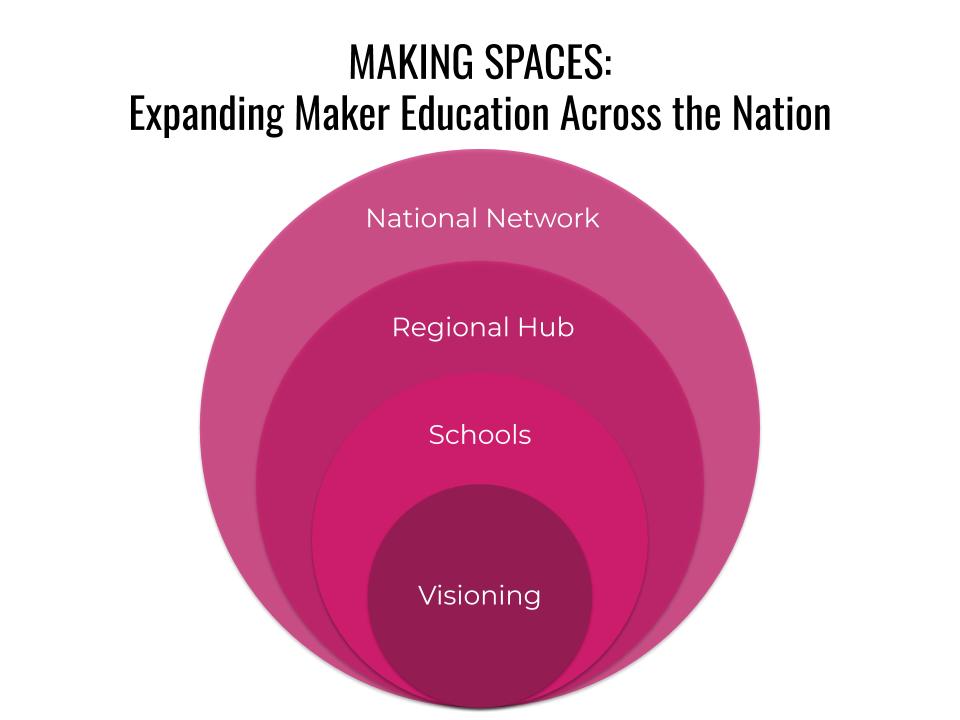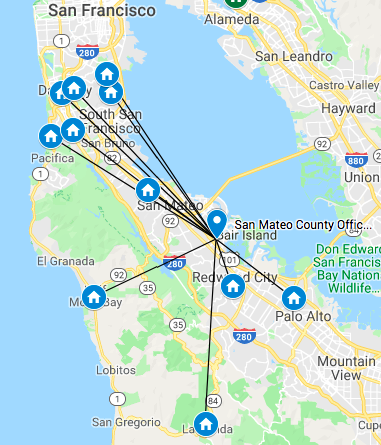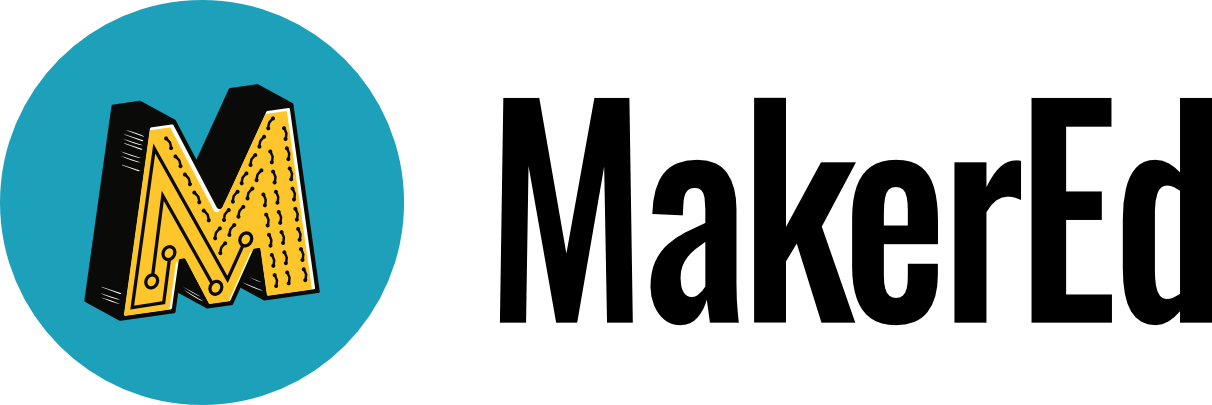We believe in the power of communities and networks, so Making Spaces is based on an ecosystem model and links systems of support for educators to transform youth experiences through making.
 There are multiple layers supporting this ecosystem. Maker Ed supports the national network with tools, resources, experience, expertise and a connection to a national community of practice. The next layer is comprised of the Hubs — from 5-10 in each Cohort — that are supported by Maker Ed to vision, build infrastructure, and implement maker-centered learning programs at 5-10 Sites in their regions. The third layer is made of the Sites themselves, as they vision, build and implement their programs. Each layer is connected to the others, providing support and benefiting from the work, insights and communities of the other.
There are multiple layers supporting this ecosystem. Maker Ed supports the national network with tools, resources, experience, expertise and a connection to a national community of practice. The next layer is comprised of the Hubs — from 5-10 in each Cohort — that are supported by Maker Ed to vision, build infrastructure, and implement maker-centered learning programs at 5-10 Sites in their regions. The third layer is made of the Sites themselves, as they vision, build and implement their programs. Each layer is connected to the others, providing support and benefiting from the work, insights and communities of the other.
We believe this model allows us to bring depth and relevance to each Hub and Site that is impacted, and to scale Making Spaces with integrity and efficiency.
What are Making Spaces Regional Hubs?
A Making Spaces Regional Hub is a school district, library, museum, or community organization that acts as a leader, trainer, and guide for multiple local educational institutions (Making Spaces Sites) to support them as they integrate making into their learning environments.
What are Making Spaces Sites?
Each Hub identifies and works with a cohort of 5-10 Making Spaces Sites in their region. These Sites can be schools, libraries, museums, or community organizations. Our goal is that at least 50% of the Sites are school environments and at least 50% are serving under-resourced communities (e.g. Title I).
What does a Making Spaces Regional Hub do?
 Maker Ed provides each Hub with tools, resources, a community, and ongoing support as they develop their own model for selecting and working with a cohort of Sites. Hubs work with their Sites over two academic years to develop a vision for each Site’s maker-centered programming, grow pedagogical strategies, shift educator practices, build capacity for integrating making in meaningful ways, raise community awareness around making, and develop funding strategies.
Maker Ed provides each Hub with tools, resources, a community, and ongoing support as they develop their own model for selecting and working with a cohort of Sites. Hubs work with their Sites over two academic years to develop a vision for each Site’s maker-centered programming, grow pedagogical strategies, shift educator practices, build capacity for integrating making in meaningful ways, raise community awareness around making, and develop funding strategies.
Hubs use a variety of methods to support partner Sites, including large group meetings; individual meetings, site visits and professional development; remote communication; and the provision of structural elements like vision and value mapping tools, action planning, stakeholder cultivation, project guides, and tool and material lists.
This suite of support may include providing professional development for educators and administrators, programming for students, consulting on curriculum or makerspace design, and assisting Sites in creating and launching fundraising campaigns or community building opportunities. In addition to knowledge sharing with the network, Hubs help “make the case for making” by participating in overall research and program evaluation efforts including data collection with their Sites and telling stories about the work.
Support Provided by Maker Ed
There are leaders around the country helping young people learn through maker education and supporting educators doing the same. Making Spaces supports these folks to increase the reach of maker education without sacrificing the quality of their programming.
Before we joined Making Spaces we were doing a lot of the workshops around making and learning ourselves. We were taking maker kits and stop motion animation kits into schools and working with teachers to do programs with their students which was absolutely fantastic but there are only four librarians who were on the project at that point in time and there are over 54 schools in Madison. So we really wanted to increase our capacity and Making Spaces made that possible.”
— The Bubbler, Madison Public Library, Madison, WI
Professional Learning
Making Spaces provides professional development to a Cohort of Regional Hubs in person and virtually throughout this partnership.
- Monthly virtual cohort meetings with all Hubs in the same cohort
- One in-person workshop per year, with optional experiences recommended
- COVID-19 update: these workshops will be virtual until further notice
- Regular one-on-one check-ins with a Making Spaces team member
- A collection of tools and resources to support the visioning, planning, and integration of making into educational environments.
The Making Spaces program and the partnership with Maker Ed, has legitimized for us something that we’re already passionate about, and given us a much stronger network, and a tremendous amount of support materials from the staff to the tools that we get to the network and the insight or an in person visits with previous cohorts.”
— BLDG 61, Boulder Public Library, Boulder, CO
Community
One of the most powerful parts of this work is connecting maker educators together to share their work, collaborate, and inspire each other.
- An online community of practice
- Connection to a nationwide community of maker educators.
The monthly calls we’ve been doing have been really motivating to keep on track … keep moving forward, but also just getting ideas and inspiration, knowing you’re not alone in this, even if you’re the only person at your [organization] working on it … having that opportunity to [connect with others in this work] is a huge blessing. HUGE. It’s rare that you have that kind of support.”
— The Scott Family Amazeum, Bentonville, AR
The meetings each month do help keep me focused on the project. I’m also encouraged to continue to engage with our educators as I am reminded about how complex the change process is and how support looks very different for each of our sites.”
— Fort Worth Museum of Science and History, Fort Worth, TX
Developing Leaders of Maker Education
Making Spaces is a nationally recognized program that supports educators and institutions to develop and grow their practice, becoming even stronger champions and leaders for maker education in their local region.
- A new approach to 1) raising community awareness around making and 2) support for professional development and related services for schools and educational partners
- Visibility, including opportunities to co-present and co-publish, in a national effort that has been featured in EdWeek and School Library Journal, and has been presented at SXSWedu and other conferences
- Institutional shifts in community, culture, and pedagogy, with an emphasis on sustainability + growth.
Making Spaces has increased our visibility in the City of Milwaukee, and increased awareness of our programs and what we offer and the resources that the museum offers.”
— Betty Brinn Children’s Museum, Milwaukee, WI
[Making Spaces] helps our Sites feel like they’re also part of something a little bit bigger. It helps them feel like this is an aspirational project that they’re working on with us in this great support system.”
— BLDG 61, Boulder Public Library, Boulder, CO
We’ve been able to help build leadership within the county. Being able to see our teacher leaders who are now leading workshops, and those schools who were a part of Making Spaces – who are now the kind of the beacons of light in those districts – where other schools are visiting to see what’s happening. That is just so exciting to know that it’s taking off. It’s going beyond one person or one organization. Making Spaces has kind of been the catalyst for a cascade of change.”
— San Mateo County Office of Education, San Mateo, CA
Membership Costs
The membership fee for Making Spaces is $15,000 per Hub, with additional costs to travel to the three workshops (if/when they occur in person). The membership fee is to be paid to Maker Ed by January 31, 2021.
If you are looking to raise funds for this work, you can use this template we have created to frame and provide language for a proposal you submit to a local foundation or funder.
Expectations for Hubs
Participation in a National Network
- Three in-person, 2-day workshops (Spring 2021, Spring 2022, Spring 2023)
- Hub covers their own travel expenses for each of these workshops (estimate travel expenses for two people from your organization to attend each workshop (~$2000 for transit and lodging))
- COVID-19 update: this will be held virtually in Spring 2021
- Monthly virtual meetings with the entire cohort
- Monthly contributions to the Making Spaces online community
- Surveys for Hubs and Sites to fill out 2-3x/year
- Share modified resources
- Optional events (e.g. CMP’s Boot Camp, Maker Ed Workshops and Convening)
Professional Learning Support with Sites
- Select and work with 5-10 Sites (schools and/or other youth-serving educational institutions)
- Aid each Site in (a) creating their maker education vision and plan for supporting their sustainable integration of making and (b) communicating this vision to their stakeholders. To this end, Hub will:
- Assist each Site in determining the particular goals at which its efforts to integrate making are directed, whether by means of professional development or design consultation.
- Support the site as they prototype maker-centered activities with youth and community. Prototyping will play a key role in determining a realistic and authentic vision and goals.
- Help each Site communicate their goals and vision to a chosen group of stakeholders (e.g. parents, students, teachers, administrators, funders) by developing an event to engage their community and celebrate their work. This could be a crowdfunding event, a student showcase, a family maker night, or other similar event.
- Continually deepen and expand partnerships with each Site by providing ongoing professional development, training, resources, and support around each Site’s unique vision for integrating making.
- Build and sustain community among their cohort of Sites by, for example, hosting regional in-person and online meet-ups for representatives from participating Sites.
- Documentation
- Community Engagement event documentation
- Case Studies of each Site and of the Hub
